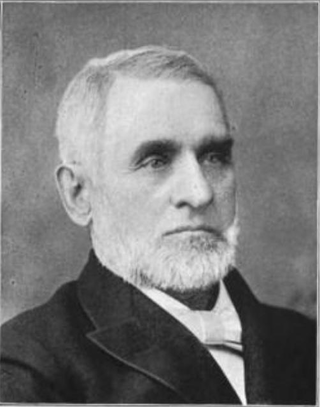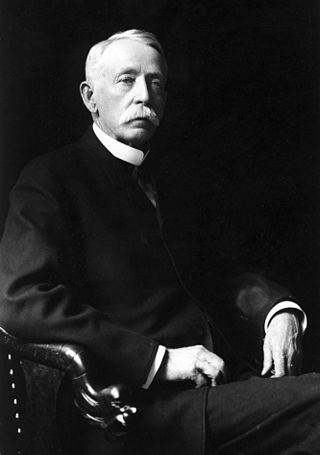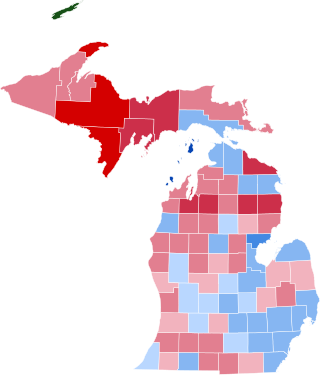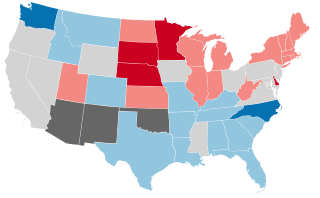
Presidential elections were held in the United States on November 4, 1884. Democratic Governor Grover Cleveland of New York narrowly defeated Republican James G. Blaine of Maine. It was set apart by mudslinging and personal allegations that eclipsed substantive issues, such as civil administration change. Cleveland was the first Democrat elected president of the United States since James Buchanan in 1856, the first to hold office since Andrew Johnson left the White House in 1869, and the last to hold office until Woodrow Wilson, who began his first term in 1913. For this reason, 1884 is a significant election in U.S. political history, marking an interruption in the era when Republicans largely controlled the presidency between Reconstruction and the Great Depression.

Presidential elections were held in the United States on November 6, 1888. Republican nominee Benjamin Harrison, a former U.S. senator from Indiana, defeated incumbent Democratic President Grover Cleveland of New York. It was the third of five U.S. presidential elections in which the winner did not win the national popular vote, which would not occur again until the 2000 US presidential election. Cleveland was the last incumbent Democratic president to lose reelection until Jimmy Carter in 1980.

The 1938 United States Senate elections occurred in the middle of Franklin D. Roosevelt's second term. The 32 seats of Class 3 were contested in regular elections, and special elections were held to fill vacancies. The Republicans gained eight seats from the Democrats, though this occurred after multiple Democratic gains since the 1932 election, leading to the Democrats retaining a commanding lead over the Republicans with more than two-thirds of the legislative chamber.

The 1890 United States House of Representatives elections were held for the most part on November 4, 1890, with five states holding theirs early in between June and October. They occurred in the middle of President Benjamin Harrison's term. Elections were held for 332 seats of the United States House of Representatives, representing 44 states, to serve in the 52nd United States Congress. Special elections were also held throughout the year.

The 1888 United States House of Representatives elections were held for the most part on November 6, 1888, with three states holding theirs early between June and September. They occurred at the same time as the election of President Benjamin Harrison. Elections were initially held for 325 seats of the United States House of Representatives, representing 38 states, to serve in the 51st United States Congress. Six new states would later join the union and increase the House to 332 seats. Special elections were also held throughout the year.

Cyrus Gray Luce was an American politician who served as the 21st governor of Michigan.

George Lewis Yaple was a politician and jurist from the U.S. state of Michigan.

Wellington R. Burt was an American lumber baron from Saginaw, Michigan. At the time of his death, his wealth was estimated to be between $40 and $90 million. For a time in the early 1900s, Burt ranked as one of the eight wealthiest men in the United States. He was best known for his lumber mills and timber holdings, but was also involved in iron mining, railroads, salt mines, and finances. Burt was a politician, holding the offices of Mayor of East Saginaw (1867–68) and member of the Michigan Senate (1893–94). In his final years, he lived alone in a mansion with his servants. Estranged from friends and family and nicknamed "The Lone Pine of Michigan", he officially died of "senility" at age 87.

The 1964 Washington gubernatorial election took place on November 3, 1964, between incumbent Democratic governor Albert Rosellini and Republican nominee Daniel J. Evans.

The 1944 United States Senate election in California was held on November 7, 1944.

A special election was held on June 5, 2001, to elect a member of the United States House of Representatives from California's 32nd congressional district to replace Julian Dixon, who died on December 8, 2000, of a heart attack.

The 1884 United States presidential election in Michigan took place on November 4, 1884, as part of the 1884 United States presidential election. Voters chose 13 representatives, or electors, to the Electoral College, who voted for president and vice president.

The 1882 Massachusetts gubernatorial election was held on November 7.

The 1886 Michigan gubernatorial election was held on November 2, 1886. Republican nominee Cyrus G. Luce defeated Fusion candidate George L. Yaple with 47.65% of the vote.

The 1896 Michigan gubernatorial election was held on November 3, 1896. Republican nominee Hazen S. Pingree defeated Fusion candidate of the Democratic, People's, and Union Silver parties, Charles R. Sligh with 55.57% of the vote.

The 1898 Michigan gubernatorial election was held on November 1, 1898. Incumbent Republican Hazen S. Pingree defeated Fusion candidate of the Democratic, People's, and Union Silver parties, Justin R. Whiting, with 57.75% of the vote.

United States gubernatorial elections were held in 1900, in 34 states, concurrent with the House, Senate elections and presidential election, on November 6, 1900.

United States gubernatorial elections were held in 1894, in 28 states, concurrent with the House and Senate elections, on November 6, 1894.

United States gubernatorial elections were held in 1888, in 26 states, concurrent with the House, Senate elections and presidential election, on November 6, 1888.

The 1902 Nebraska gubernatorial election was held on November 4, 1902. Republican nominee John H. Mickey defeated Democratic and Populist fusion nominee William Henry Thompson with 49.69% of the vote.






















